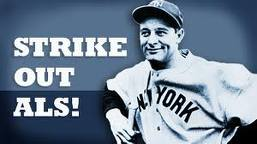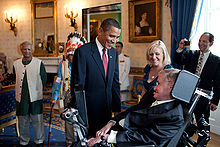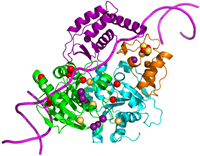A good time to learn as much as possible about "Iron Horse" Lou Gehrig® (and the always fatal ALS Disease (named after Lou Gehrig®) is today so read about ALS Disease...
Welcome to "Lou Gehrig's" Organization, your online source for the latest ALS health information about ALS and Lou Gehrig's disease...
 We are on an ongoing Mission of giving health information about ALS & Lou Gehrig® Disease and researching potential life-prolonging treatment options...
We are on an ongoing Mission of giving health information about ALS & Lou Gehrig® Disease and researching potential life-prolonging treatment options...
Lou Gehrig's disease is one of the chronic disorders known as Motor Neuron Disease which involves gradual but ongoing degeneration and eventual death of the bodies motor neurons, causing continuing loss of body function and muscle control, which disease is sadly incurable and always fatal in the-end (with the possible exception of Stephen Hawking - read more about Stephen below)...
Exactly What is Amyotrophic Lateral Sclerosis?
Amyotrophic lateral sclerosis (ALS), commonly called Lou Gehrig's disease, is a rapidly progressive, invariably fatal neurological disease attacking nerve cells (neurons) responsible for controlling voluntary muscles. Lou Gehrig's Disease is a condition involving the slow but never-ending decline of the body's muscles.
Motor neurons are nerve cells located in the brain, brainstem, and spinal cord that serve as controlling units and vital communication links between the nervous system and the voluntary muscles of the body. Messages from motor neurons in the brain (called upper motor neurons) are transmitted to motor neurons in the spinal cord (called lower motor neurons) and from them to particular muscles.
In ALS disease both upper motor neurons and lower motor neurons degenerate or die, ceasing to send messages to muscles. Unable to function, the muscles slowly weaken as time goes by, wasting away (atrophy), and twitch (fasciculations). Eventually, the ability of the brain to start and control voluntary movements is lost.
ALS causes weakness with a wide range of disabilities (see section titled "What are the symptoms?"). Eventually, all muscles under voluntary control are affected, and patients lose their strength and ability to move their arms, legs and body. When muscles in the diaphragm and chest wall fail, patients lose the ability to breathe without a ventilator.
Although ALS disease usually does not impair a person's mind or intelligence, several recent health studies suggest some ALS patients may have alterations in cognitive functions such as depression and problems with decision-making and memory.
ALS does not affect a person's ability to see, smell, taste, hear, recognize or touch. Patients usually maintain control of eye muscles and bladder and bowel functions, although in the late stages of the disease most ALS patients will need help getting to the bathroom.
Who gets Lou Gehrig Disease?
Has there ever been a Decades-Long ALS Survivor?
An estimated 20,000 to 30,000 people in the United States have ALS-disease, and approximately 5,000 people in the U.S. are diagnosed with " Lou Gehrig's disease" every year. ALS is one of the most common neuromuscular diseases worldwide, and people of all races and ethnic backgrounds are affected. ALS most commonly strikes people between 40 to 60 years of age, but younger and older people may also develop ALS disease. Men are affected more often than women.
In at least 90-percent of all ALS cases diagnosed, the disease occurs apparently at random, with no clearly associated risk factors. Patients do not have a family history of the disease, and their family members are not considered to be at increased risk for developing ALS.
According to medical records at the national library of medicine, most people with ALS die from respiratory failure, usually 3 to 5 years from the onset of ALS symptoms and its diagnosis, with about 10 percent of patients surviving for 10 years.
However, there is hope based on "Stephen Hawking", a well known scientist, cosmologist and physicist, who is severely disabled by Amyotrophic Lateral Sclerosis (ALS) when he was diagnosed with ALS disease at the age of 21 in 1963 (Dr Hawking was born in England on Jan 8th 1942).
At the time of his Lou Gehrig's disease diagnosis; Hawking's doctor predicted he would survive no more than 3-years. That's right, Dr. Hawking has had ALS for going on 5-decades, with his Lou Gehrig disease amazingly not on its typical progressive course!
Stephen Hawking's Lou Gehrig's disease progression is extremely different compared to typical ALS sufferers. His longevity (even though his overall
 health has been extremely poor), is by far the longest lasting case of Lou Gehrig's disease survival ever documented.
health has been extremely poor), is by far the longest lasting case of Lou Gehrig's disease survival ever documented.
With that said, Stephen Hawking has slowly lost the use of his legs, arms and voice. In the picture to the right, Dr Hawking is making good use of his electronic voice synthesizer for communications with President Barack Obama. Since 2009 he has been almost completely paralyzed.
Survival for as long as 10-years upon ALS diagnosis is rare. Stephen Hawking's unexplained longevity of almost 50-years of ALS survival after Lou Gehrig disease diagnosis is incredible (so yes, there is a bit of hope, but unfortunately (without a medical breakthrough) a hope of longevity greater than 10-years is quite slim.
About 5 to 10 percent of all ALS cases are inherited. The familial form of ALS usually results from a pattern of inheritance that requires only one parent to carry the gene responsible for the disease. About 20 percent of all familial cases result from a specific genetic defect that leads to mutation of the enzyme known as super-oxide-dismutase-1. Research on this mutation is now providing clues about the possible causes of the motor neurons deaths with ALS. Not all familial ALS cases are a result of the SOD1 mutation, therefore other unidentified genetic causes must be present.
What are the known Symptoms and Causes of ALS?
The onset of ALS may be so subtle that the symptoms are frequently overlooked. The earliest symptoms may include twitching, cramping, or stiffness of muscles; muscle weakness affecting an arm or a leg; slurred and nasal speech; or difficulty chewing or swallowing. These general complaints then develop into more obvious weakness or atrophy that may cause a physician to suspect ALS.
The parts of the body affected by early symptoms of ALS depend on which muscles in the body are damaged first. In some cases, symptoms initially affect one of the legs, and patients experience awkwardness when walking or running or they notice that they are tripping or stumbling more often. Some patients first see the effects of the disease on a hand or arm as they experience difficulty with simple tasks requiring manual dexterity such as buttoning a shirt, writing, or turning a key in a lock. Other patients notice speech problems.
Regardless of the part of the body first affected by Lou Gehrig's disease, muscle weakness and ALS will slowly spread to other parts of the body as Lou Gehrig disease progresses and the patient atrophy and overall  wellness and health worsens. ALS patients have ever-increasing problems with moving, swallowing (dysphagia), speaking and forming words (dysarthria).
wellness and health worsens. ALS patients have ever-increasing problems with moving, swallowing (dysphagia), speaking and forming words (dysarthria).
The symptoms of upper motor neuron involvement include tight and stiff muscles (spasticity) and exaggerated reflexes (hyperreflexia) including an overactive gag reflex. An abnormal reflex commonly called Babinski's sign (the large toe extends upward as the sole of the foot is stimulated in a certain way) also indicates upper motor neuron damage.
Lower motor neuron symptoms involve muscle degeneration and muscle weakness. with atrophy, muscle cramps, and brief muscle twitches that can be seen under the skin (fasciculations).
To be diagnosed with ALS, patients must have signs and symptoms of both upper and lower motor neuron damage that cannot be attributed to other causes.
For more detailed information about ALS and its causes and symptoms, please also visit The National Institutes of Health ALS Disease center regarding health information about "Amyotrophic Lateral Sclerosis" aka "ALS Disease" but typically referred to as "Lou Gehrig's Disease." ALS/LouGehrig Disease is a rapidly progressive, and unfortunately always fatal neurological disease which attacks the nerve cells which control the body's voluntary muscles.
Although the sequence of emerging symptoms and the rate of ALS disease progression vary from person to person, eventually patients will not be able to stand or walk, get in or out of bed on their own, or use their hands and arms. Difficulty swallowing and chewing impair the patient's ability to eat normally and increases risk of choking. Maintaining weight will then become a problem.
Because the disease usually does not affect cognitive abilities, patients are aware of their progressive loss of function and may become anxious and depressed. A small percentage of patients may experience problems with memory or decision-making, and there is growing evidence some patients may even develop a form of early state dementia. Health care professionals need to explain the course of the ALS disease and describe available treatment options so ALS patients can make informed decisions, and possibly live a bit longer life.
In the late-stages of Lou Gehrig disease, ALS patients have difficulty breathing as the muscles of the respiratory system weaken. Patients eventually lose the ability to breathe on their own and must depend on ventilatory support for LouGehrig disease survival. Patients also face an increased risk of serious lung conditions which can easily lead to pneumonia, especially during the later stages of Lou Gehrig's Disease.
You can pay a visit to Symptoms & Causes health website with access to health resources about other disease and medical conditions
Please visit Club 3000 if you are you looking for baseball and sports information instead of health related and Lou Gehrig's disease.





